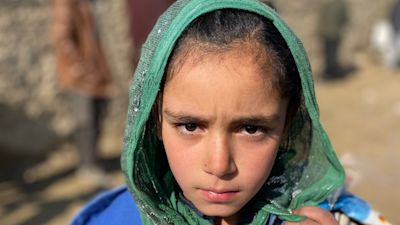Insight
Afghanistan’s meltdown: Who exactly is to blame and who can fix it?

‘’Everyone in Afghanistan, whether they are rich or poor, they want to get out of the country’’ .
These are words from the last conversation I had in Kabul as we headed to the airport after two weeks of witnessing the nation's meltdown. What we saw – and you see in the broadcast reports featured here - is not, I believe, the worst of it. More likely it is but a preface.
Most mornings, Rabia picks through rubbish heaps to support her hungry family. She showed me her family home, which is just a single room.
The United Nations warns that, from the parents desperate enough to offer their daughters for sale, to the hospital wards of malnourished babies and the children combing rubbish dumps for food scraps, the worst may yet be to come. To be sure, it is important to recognise that Afghanistan was some way short of a functioning state before last August. If the West had made a better fist of nation building, then the Taliban could not have returned with such ease.
And it is dislocating to see amid so much hunger and want, markets that are full of fresh oranges among much else. Yet all of that is beyond the reach of millions of Afghans. This is an economic crisis. There are few jobs and little money. Afghanistan is suffering because of the failure of successive regimes over decades and conflict that dates back generations.
Western intervention has always ended in disaster. But the world is being asked to intervene again – this time to save lives, not to try to create a democracy.
It is in our own interests to do so, said Gordon Brown in response to our reports, if we are to avoid a migrant crisis or as others have warned, the rise here of Islamic State. I wondered about all those children we met; how they might grow up filled with contempt for a world that has abandoned them and how easy it would be for extremist ideology to poison their minds. It will mean not just billions of pounds of humanitarian aid, it will mean easing the financial strait jacket designed to isolate Afghanistan’s new rulers, and it will mean – and this is the unpalatable bit to many – dealing with the Taliban, who tolerated our presence because they believe all this must end with their recognition by the outside world as a legitimate government.
On landing in Afghanistan, I found that the country's worst drought in 30 years had been followed by a freezing winter, leaving nine million people at risk of famine
And it must be a long-term commitment. This is not a single emergency triggered by natural disaster and solved by tons of bag of grain and beans. This enfolding tragedy is the culmination of decades of abject policy failure. Withdrawing western troops was easy. What comes next will be much harder.
Former prime minister Gordon Brown and human rights campaigner Malala Yousafzai have joined together with Save The Children to launch a petition calling on the UK government to launch an emergency multi-nation conference to raise the £3.32 billion the UN are appealing for to Save Afghan Lives.
Alternatively, click here to donate to the Disasters Emergency Committee (DEC) Afghanistan Crisis Appeal, a charity made up of 15 UK aid charities that specialises in humanitarian aid and disaster response. Its current appeal aims to help the eight million people in Afghanistan who are at risk of famine this winter.